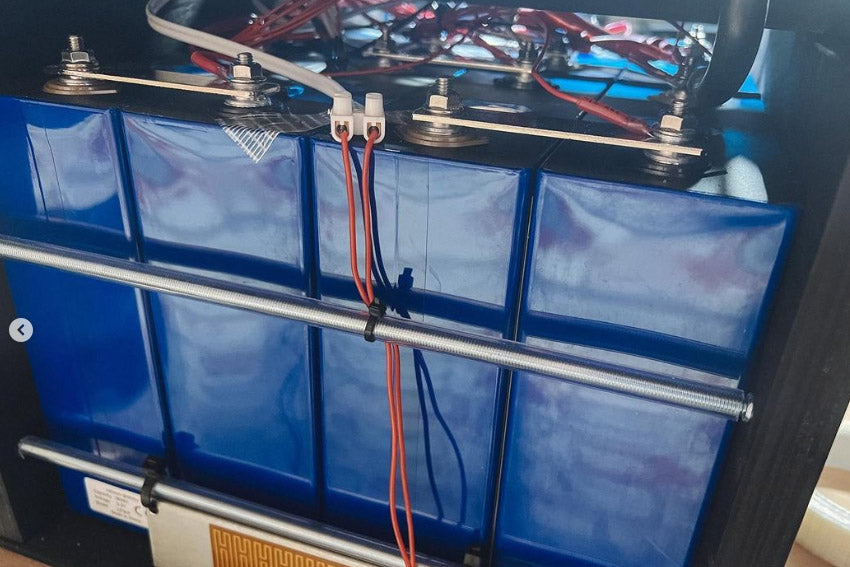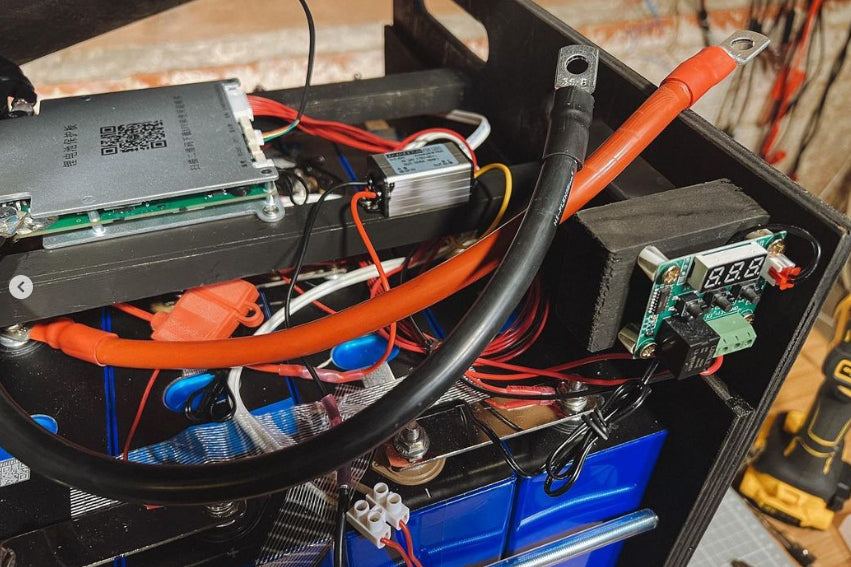Why choose Diypow RV LiFePO4 Batteries?
Our Diypow deep cycle RV batteries are created with the highest quality materials and assembly. These are no doubt, peak-performance batteries, built for the long haul:
1. Enjoy long-lasting batteries that are 50% lighter, built-in Bluetooth monitoring, and require NO maintenance
2. Explore longer & go farther with Ionic lithium batteries backed by an industry best 10 year warranty
3. Take your RV system to the next level with lithium RV batteries.
Diypow 36V 120AH Drop-In SLA Replacement Deep Cycle LiFePO4 Battery Pack
Diypow 48V 120AH Drop-In SLA Replacement Deep Cycle LiFePO4 Battery Pack
Diypow 12V 400AH Deep Cycle LiFePO4 Battery Pack | 5.12KWh & 5.12kW
Diypow 48V 30AH Drop-In SLA Replacement Deep Cycle LiFePO4 Battery Pack
36V 100AH Diypow Deep Cycle LiFePO4 Battery Pack Low Temperature Protection
36V 200AH Diypow Deep Cycle LiFePO4 Battery Pack Low Temperature Protection
Best Lithium Deep Cycle RV House Batteries
Have you ever thought about what you need most when you are driving your RV as a family and having a nice vacation in the countryside or at a beautiful lake? Undoubtedly, it would be to have enough electricity to cook a delicious meal by yourself. This is achievable.
In fact, it's all about installing a small photovoltaic system in your RV. All you need is one or two PV modules with PV inverters and batteries, and you have a perfect RV PV system. You can enjoy your vacation time at the lake with your family.
Speaking of batteries, we have to mention our lithium iron phosphate batteries. Our lithium batteries are perfectly matched with various RV systems and can store huge capacity for various appliances in the RV.
Are you looking for best RV battery? Hurry up to assemble your RV system, drive your RV and have a nice weekend trip.
More Application Scenarios
The RV Batteries Technology Types
⚡LEAD-ACID BATTERIES
⚡AGM BATTERIES
⚡GEL BATTERIES
⚡LITHIUM BATTERIES
Diypow Lithium RV Batteries
⭐Consistent Output
⭐Long Lasting
⭐1/3 Lighter Than Lead Acid Battery
⭐6 Strong Protections
⭐Fast Charge
⭐Higher Discharge Rate
Best Selling RV Batteries
Diypow 36V 60AH Drop-In SLA Replacement Deep Cycle LiFePO4 Battery Pack
36V 100AH Diypow Deep Cycle LiFePO4 Battery Pack Low Temperature Protection
Diypow 48V 30AH Drop-In SLA Replacement Deep Cycle LiFePO4 Battery Pack
Diypow 48V 100AH Drop-In SLA Replacement Deep Cycle LiFePO4 Battery Pack
Diypow RV Batteries Buying Guide
When you overcharge or discharge a battery for longer than expected, the RV's battery system is likely to fail, a condition where the battery is unable to complete its cycle.
RVs use several types of batteries, including lead-acid batteries, AGM batteries and lithium-ion batteries, which are a combination of multiple batteries to meet the power needs of a recreational vehicle.
The life of an RV deep cycle battery depends on its use and other factors, such as when you charge the battery, how many hours you charge it, and how many hours you take the charger away. In this real life buying guide, I will explain to you everything related to RV lithium batteries.
- Are lithium batteries better for RVs?
- What kind of battery should you use in an RV?
- What types of RVs are there in the market?
- How do RV batteries work?
- What is the purpose of a 12-volt battery on an RV?
- How long do RV batteries normally last?
- Is there a difference between an RV battery and a car battery?
- Should I use parallel or series batteries for the RV?
- How do I know how many amps my RV needs?
- How many batteries do I need to run my RV AC?
- Should you take the battery out of your RV for the winter?
- How many batteries does an off-grid RV take?
- Do RV batteries charge while driving?
- Can an RV battery run the refrigerator?
- Can solar panels power RV AC?
1. Are lithium batteries better for RVs?
Simply put, yes, RV deep cycle batteries not only last much longer than lead-acid batteries, but they are also lighter. And, because they are more efficient, they recharge faster as well.
2. What kind of battery should you use in an RV?
In order to power the electronics of your travel trailer, you need a deep-cycle battery. Deep cycle batteries provide continuous power for long periods of time. Most travel trailers have one or more batteries. The battery provides power to your RV when there is no external power source. You are able to run different car appliances such as lights, water pumps, microwave ovens, etc.
The most commonly used is the 12V RV battery, but when you need more power, the following are also good options:
- 12V RV battery
- 24V RV battery
- 36V RV battery
- 48V RV battery
3. What types of RVs are there in the market?
There are many different types of RVs that can be purchased from the market, depending on size and specifications. Want to find the best RV batteries?
Below is a list of some of the RVs available.
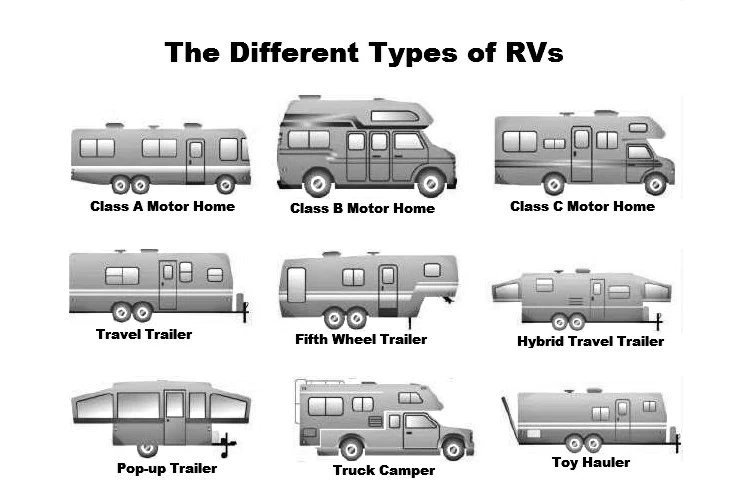
Class A Diesel & Gas Motorhome RV's
Diesel motorhomes are mainly used for special tours when you visit specific areas where you need more engine power and greater energy to work with the motorhome equipment. These diesel motorhomes have more engine power and longer durability to run. When you talk about gas RVs, most of these come with better comfort and are also useful for long trips with different kinds of home accessories such as microwave ovens, refrigerators, washing machines, etc.
Class B RV
Class B motorhomes are smaller in size but very fast in terms of travel as well as camping purposes, if you want to explore different remote areas around the countryside then you can use this motorhome. There are some other types of towable RVs.
- Camping fifth-wheel caravans
- Toy hauler
- Travel trailer RV
- Teardrop RV
Class C RVThis motorhome is also used for camping purposes in different areas. Compared to other A-class motorhomes, this one is smaller in size.
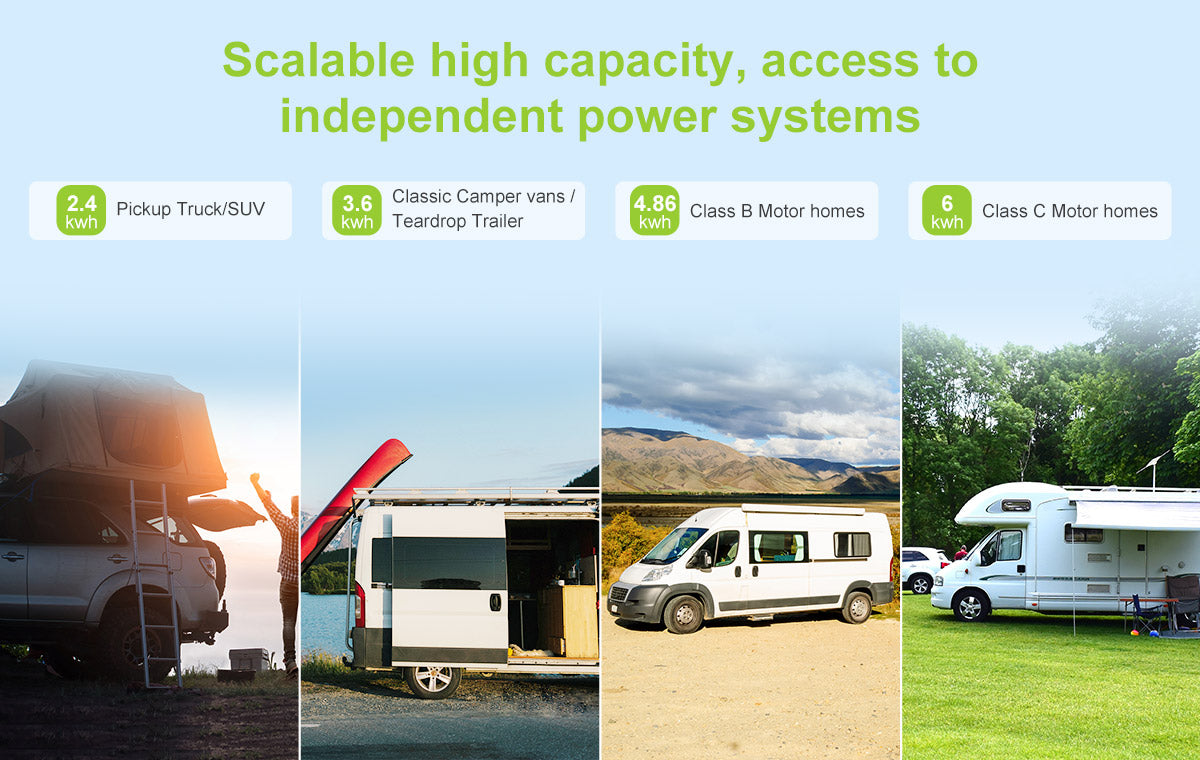
4. How do RV batteries work?
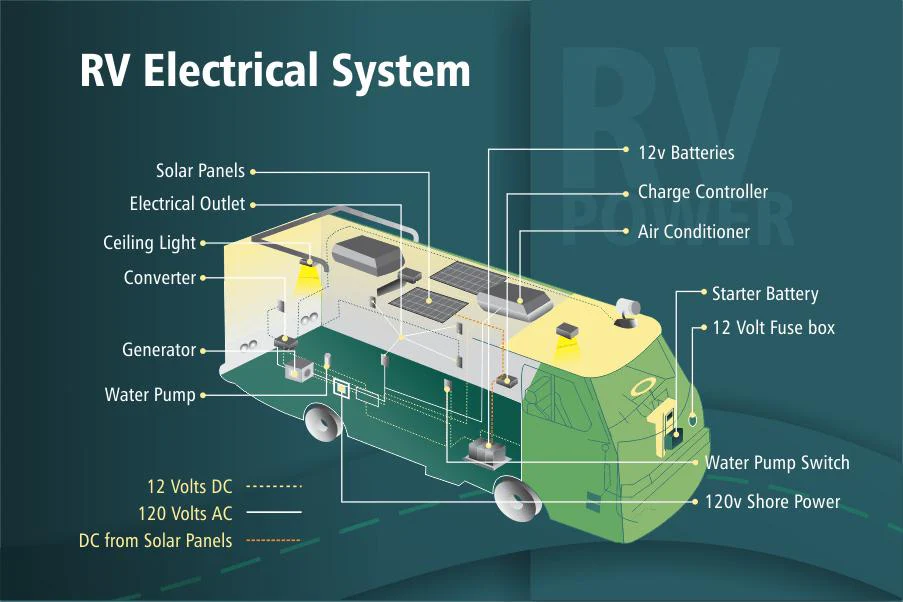
When lithium ion rv batteries are installed with the engine, they act as starting batteries that provide an electrical spark to the RV engine to start the engine and these batteries are immediately charged with the help of the RV engine.
When you talk about deep cycle RV batteries, these batteries are usually used to run RV household appliances such as microwave ovens installed in RVs for cooking, refrigerators for storing different types of food and other necessary household appliances.
When a deep cycle battery is connected to an RV appliance, it acts as a powerhouse to provide the needed electrical power to the RV appliance.
5. What is the purpose of a 12-volt battery on an RV?
Your 12V battery system will power most of your basic systems, such as your lights and some household appliances. You will charge this battery system while plugged into shore power and utilize it while traveling or wilderness docking.
6. How long do RV batteries normally last?
A properly maintained deep-cycle battery should last 10 years or more. Unfortunately, some RV owners replace their batteries every year or two. Extending battery life is not difficult, it just requires some basic care and maintenance.
7. Is there a difference between an RV battery and a car battery?
RC is different. Deep cycle batteries have a higher RC and provide more sustained energy compared to regular batteries. Size. Deep cycle batteries are smaller and lighter than regular batteries, which is why they work so well in recreational vehicles.
8. Should I use parallel or series batteries for the RV?
For general marine boat and RV applications, parallel wired cells provide the easiest wiring and common voltage, however, for larger applications over 3000 watts, using higher voltage series may be best.
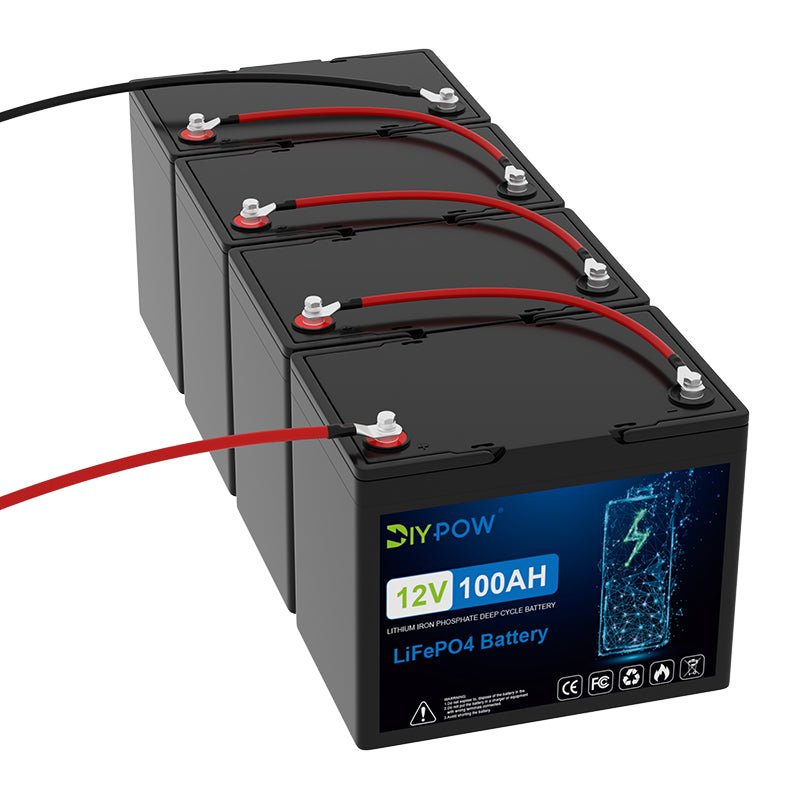
9. How do I know how many amps my RV needs?
Most RVers agree that 220 amp hours is enough to run some appliances and watch TV. However, this is not an absolute standard answer. How many amp hours you need depends on how many appliances you will be using, whether you will be carrying a generator for charging, and so on.
10. How many batteries do I need to run my RV AC?
A smaller and more efficient RV air conditioner will run for 4-12 hours on a 12V 300 amp hour Diypow lithium battery. Smaller air conditioners typically have a cooling capacity of 5,000-6,000 btUs and draw 40-80 amps at 12 volts.
11. Should you take the battery out of your RV for the winter?
When you store your RV during the off-season, you also need to remove your battery and keep it in a warm location. If you leave it in, the water in the battery may freeze when the temperature drops too low. This happens because the battery loses sulfuric acid when it is discharged and leaves water behind.
12. How many batteries does an off-grid RV take?
Most of your RV applications require 12V current, so you need two 12V batteries. If one of the 12V batteries goes bad, you don't have a usable power source. However, if two 12V batteries are connected and one does not work, you still have a usable 12V supply.
13. Do RV batteries charge while driving?
Most RVs have a second battery connected to the generator so that when you drive, the generator is automatically charged. This way, the second battery is always able to provide power to your appliances, lights and other electronics.
14. Can an RV battery run the refrigerator?
In short, yes. Because it uses entirely DC power, it doesn't need gas or AC power. In most cases, it is charged by rv deep cycle batteries, often by solar power. Best of all, it can be powered by the RV's alternator, which means a 12V RV fridge works while driving!
15. Can solar panels power RV AC?
The short answer is yes, you can use solar power alone to run your RV air conditioner. Solar panels convert sunlight into electricity, which you can use to power devices such as your air conditioner.










